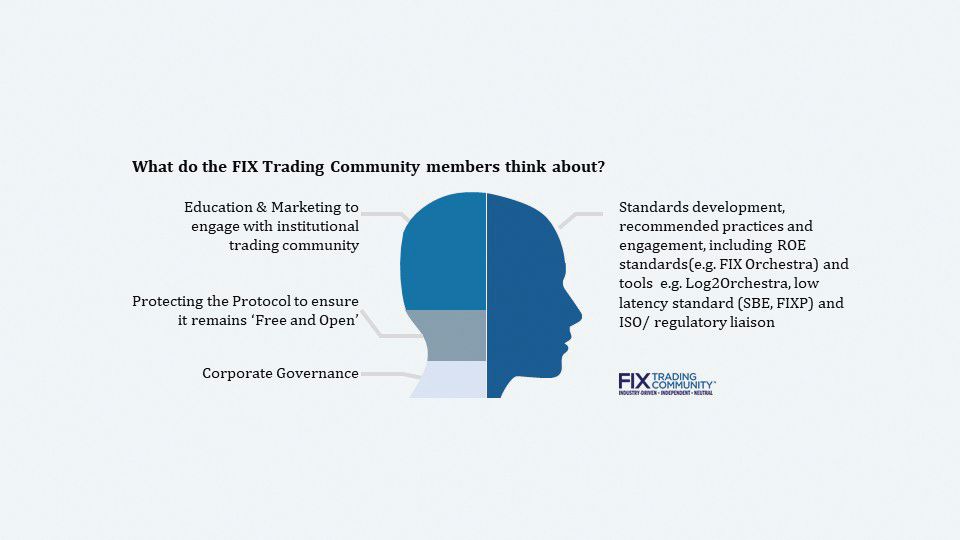Why Being a FIX Trading Community Member Matters — And Why You Should Contribute
By Rich Evans, Global Co-chair of FIX Trading Community, and Lee Saba, Global Co-chair of FIX Trading Community and Head of Market Structure, Rialto Markets
In an era of focus on good governance, every firm’s contribution to the FIX community matters more than ever.
FIX has served the electronic trading community for more than two decades. Our group is all about how to make cooperation work in a market that is known for being uber-competitive. Every day, billions of FIX messages travel across the globe providing clear and unambiguous trading information: indications of interest (IOIs), trading instructions, execution confirmations, and allocation and settlement information.

However, this does not happen for free. It isn’t magic. The framework has been developed by a group of industry experts who recognised that competition in certain operational elements of the industry is a ridiculous waste of effort and money, and understood that cooperation would provide three big advantages – cost savings, time to market, and a significant reduction in operational risk.
At the outset it seemed an almost impossible task, but with a core of highly qualified subject matter experts the first version of FIX was created. A few firms started the task of achieving physical connectivity via a simple phone call confirmed by a FIX message – which immediately reduced the risk of a misheard or misinterpreted conversation. As more trading flows were defined and used within the FIX protocol, operational risk within the trading process was reduced further. Whilst many felt that this innovation meant the end of the road for dealers, the simple reality was that it took away the time needed for the risky, non-value added part of their job and allowed firms to really start to innovate.
Behind every development and enhancement to the protocol stands an army of volunteers, but as the protocol developed it became impossible for the protocol to stand alone on volunteer resources. The leadership (volunteers) had to juggle providing practical support and managing their day jobs.
The need to invest real money into the protocol was not just about support – it was also about protecting the protocol as a free and open standard. Over the past 20 years FIX Trading Community has spent significant sums to protect the protocol against various claims that others had the idea first. Just think of how much licensing costs could have been if a challenge had been successful.

Licensing the protocol, while considered, was never really an option as it broke the fundamental aims and objectives of the organisation. Instead, a membership model was introduced with the expectation that the industry would do the right thing and support the development and protection of the protocol. This has been a very successful model for 20 years, and the industry is grateful to all firms who continue to pay their share.
Over the years the community has introduced rewards for members including reduced sponsorship, free passes to conferences, and access to technical committee resources. But these are only the rewards for contributing; they should not be the sole reason for membership.
Budgets are always tight, and when firms consider joining they may ask “what is the impact of us not being a member?”. In the short term the impact is probably limited, and though firms are unable to participate in the discussion and set the direction for the protocol, they think that because the FIX Trading Community is collaborative, they can probably get the information from somewhere – perhaps a client or a vendor.
But is that acceptable?
If you were paying for a software license, there is would be no discussion around maintaining the payments – so why would FIX membership be viewed differently?
Consider these points:
As the industry moves into a world where there is intense scrutiny on good corporate governance – is it ethical not be contributing – to use the protocol every working day of the year – passing your most valuable information in a safe, secure and unambiguous way, while significantly reducing your operation risk? Simply put, No.

Can the FIX Protocol continue evolve and keep up with market trends, regulatory change and business process changes without a team of resources to back up the volunteers? Simply put, No.
Is it good governance to use software using a protocol that you do not contribute to? Is it good governance not to be part of the SMEs who create and maintain the protocol and are at the centre of its development? Again, No.
So, when you think that you can save a few dollars by not joining whilst using the protocol without contributing – consider the day that FIX is no longer developed or maintained, and every connection to every counterparty will become marginally different. The day that regulations change and every counterparty will chose to do it slightly differently – think of the consequences.
We are all in this together. Our industry needs to do the right thing, and we are lucky that most of the industry does. Make sure your firm is not an outlier.

